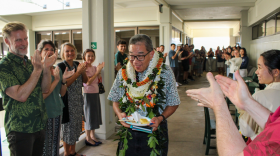Some of the state’s last honey bee colonies without disease are on Kauaʻi, and beekeepers are trying to keep it that way.
In the 12 months following April 2022, beekeepers in the U.S. lost about 48% of their bee colonies, according to a June publication by the nonprofit Bee Informed Partnership.
The biggest contributor has been the parasitic varroa mite, which feeds on honey bee larvae and transmits diseases.
Varroa mites have not yet been detected on Kauaʻi, Maui and Molokaʻi.
Staff and volunteers with the Kauaʻi Community College Apiary Project are hoping to keep the mite off the island, the University of Hawaiʻi said in a news release.
“I’d say we have the healthiest bees in the world right here on Kauaʻi, because the varroa mites have not arrived, yet, which is a great advantage to us and to the whole beekeeping community on Kauaʻi,” said Alan Spencer, a volunteer for the Apiary Project.
Varroa mites were first detected in Hawaiʻi in 2007 and have decimated the islands’ colonies.
The Apiary Project breeds queen bees from Kauaʻi colonies as one of the ways to keep the mites away.
Spencer said the practice reduces the possibility that an infected queen is introduced to the island.
KCC Academic Advisor Valerie Melle wants to restart the college’s application to the state Department of Agriculture to export their bees. There is also some interest in having the college start an on-site apiary for hospitality and culinary purposes.
An “adopt-a-beehive” program may come in the immediate future.
In addition to keeping Kauaʻi bees healthy, the efforts would also benefit the island’s beekeepers and agriculture as a whole.






